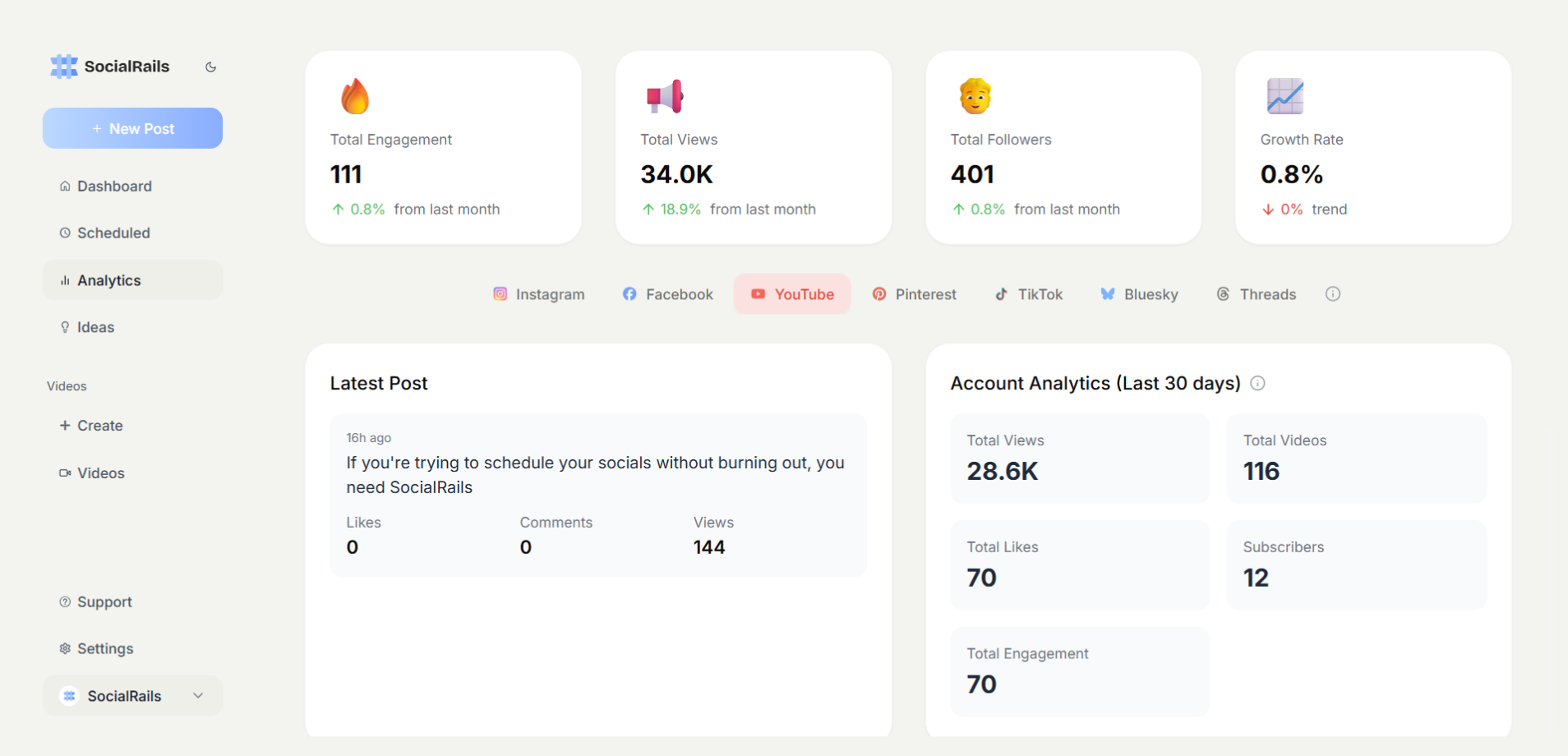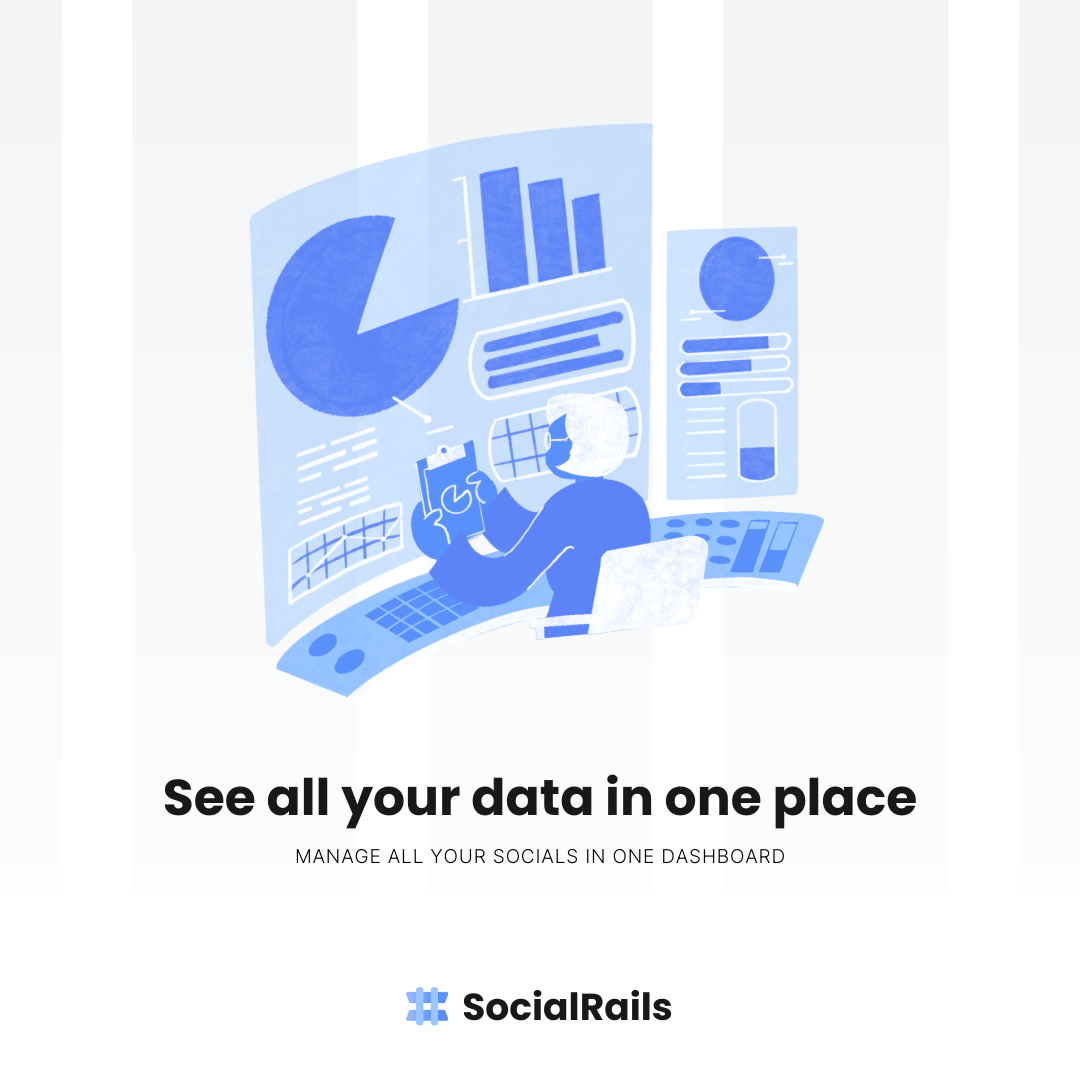What is Social Media Performance?
Social media performance means checking your social media data to see what works and what doesn't, then making simple changes to get more likes, comments, shares, and sales.
Create content, post everywhere
Create posts, images, and carousels with AI. Schedule to 9 platforms in seconds.
Start your free trialWhy You Need to Track Performance
Save Money and Time
Stop wasting time on posts that don't work. Focus on what gets results.
Get More Engagement
Learn what your followers love so you can create more content they'll interact with.
Beat Your Competition
Stand out from others by posting content that really connects with people.
Grow Faster
When you know what works, you can do more of it and grow your following quickly.
Important Numbers to Watch
Things People Do With Your Posts
- Engagement rate: How many people like, comment, or share compared to how many see your posts
- Good comments: Real conversations, not just emoji reactions
- Saves and shares: How often people think your content is worth keeping or showing friends
- Link clicks: How many people click your links
How Many People See You
- Free reach: People who see your posts without ads
- How visible you are: Your posts compared to everyone else's
- People talking about you: How often your brand gets mentioned
- Hashtag success: Which hashtags help people find you
Business Results
- Website visitors: People who visit your site from social media
- New leads: Email sign-ups and contact forms from social posts
- Sales from social: Money made directly from social media
- Cost per customer: How much you spend to get each new customer
- Brand evaluation: Regular brand audits help assess social media's impact on brand perception

How to Improve Your Performance Step-by-Step
Your Performance Journey
Check Your Numbers
Look at your stats weekly and monthly. Compare how you're doing on different platforms. Find your best and worst posts.
Find What to Fix
Look for topics your followers want, better times to post, new content types to try, and ways to improve for each platform.
Test New Ideas
Try different versions of posts to see what works. Make small changes one at a time. Track how each change performs.
Keep Improving
Use what you learned to make more changes. Keep testing and learning. Your performance will get better over time!
Simple Ways to Make Better Content
Make Your Content Look Better
- Use clearer, brighter photos and videos
- Write captions that make people want to read more
- Tell stories that connect with your followers
- Be clear about how you can help people
Post at the Right Times
- Find when your followers are online and active
- Remember each platform has different best times
- Videos might work better at different times than photos
- Think about time zones if you have followers worldwide
Mix Up Your Content
- Use different types: photos, videos, carousels, and text posts
- Balance fun posts, helpful tips, and product info
- Create weekly series your followers can look forward to
- Share content from your happy customers

Tips for Each Platform
Instagram Tips
- Organize your Story Highlights into clear categories
- Make fun, short Reels that entertain people
- Use hashtags that your target audience follows
- Tag products to make shopping easy
LinkedIn optimization
Professional content focus, Industry insights and thought leadership content
Article performance, Long-form content that showcases expertise
Network engagement, Strategic commenting and professional relationship building
Company page optimization, Professional presentation and regular updates
TikTok optimization
Trend participation, Joining relevant trends while maintaining brand voice
Video editing improvement, Better production quality and engaging openings
Sound optimization, Using trending audio effectively
Community engagement, Responding to comments and creating duets
Facebook optimization
Algorithm understanding, Creating content that Facebook's algorithm favors
Community building, Fostering discussion and meaningful interactions
Event promotion, Using Facebook's event features effectively
Live video utilization, Real-time engagement opportunities
Technical optimization techniques
Posting schedule optimization
Data-driven timing, Use analytics to identify peak engagement times
Consistency maintenance, Regular posting schedules that audiences expect
Cross-platform coordination, Strategic timing across multiple platforms
Content calendar optimization, Better planning for improved performance
Hashtag strategy optimization
Performance tracking, Monitor which hashtags drive the most engagement
Mix optimization, Balanced use of popular, niche, and branded hashtags
Research tools, Use hashtag analytics to discover new opportunities
Seasonal adjustments, Adapt hashtag strategy based on trends and events
Visual content optimization
Image quality improvement, Higher resolution, better composition, consistent branding
Video optimization, Proper formatting, captions, and engaging thumbnails
Brand consistency, Cohesive visual identity across all content
Accessibility features, Alt text and captions for inclusive content
Advanced optimization strategies
Audience segmentation
Content customization, Different content for different audience segments
Platform-specific audiences, Tailoring messages for each platform's unique users
Demographic optimization, Adjusting content for different age groups, locations, interests
Behavioral targeting, Creating content based on how people interact with your brand
Competitive analysis
Competitor content study, Learning from what works for similar brands
Gap identification, Finding opportunities your competitors are missing
Best practice adoption, Implementing successful strategies from your industry
Differentiation strategies, Standing out from competitors with unique approaches
Automation optimization
Scheduling efficiency, Using tools to post at optimal times automatically
Response automation, Chatbots and auto-responses for common questions
Content curation, Automated sharing of relevant industry content
Performance monitoring, Automated alerts for significant performance changes
Measuring optimization success
Performance improvement metrics
Engagement rate increases, Comparing before and after optimization periods
Reach growth, Expanding audience and content visibility
Website traffic improvement, More visitors from social media sources
Conversion rate increases, Better business results from social media efforts
Efficiency metrics
Time savings, Optimized processes that reduce content creation time
Cost effectiveness, Better results per dollar spent on social media
Resource allocation, More strategic use of team time and effort
ROI improvement, Better business results relative to social media investment
Long-term growth indicators
Audience growth quality, Attracting more engaged, relevant followers
Brand sentiment improvement, More positive mentions and feedback
Market share gains, Increased visibility compared to competitors
Customer lifetime value, Higher value customers acquired through social media
Common optimization mistakes
Over-optimization without testing
Making too many changes at once makes it impossible to know which changes actually improved performance.
Focusing only on vanity metrics
Optimizing for likes and followers without considering business impact can lead to meaningless growth.
Ignoring platform-specific differences
Using the same optimization strategies across all platforms ignores each platform's unique characteristics and audiences.
Not giving changes enough time
Stopping optimization efforts too quickly before they have time to show results.
Optimization tools and resources
Analytics platforms
Native platform analytics, Built-in insights from each social media platform
Third-party analytics tools, Complete cross-platform performance tracking
Google Analytics, Website traffic and conversion tracking from social media
Social listening tools, Monitor brand mentions and sentiment changes
Testing and optimization tools
A/B testing platforms, Tools for comparing different content versions
Scheduling and automation tools, Consistent posting for better performance comparison
Content creation tools, Better visual content for improved engagement
Hashtag research tools, Finding the most effective hashtags for your content
Performance optimization with SocialRails
SocialRails supports optimization through:
Complete analytics, Track performance across all 9 platforms in one dashboard
Posting optimization, Schedule content at optimal times for each platform
Content performance tracking, Identify your best-performing content types and topics
Cross-platform comparison, See which platforms and strategies work best for your brand
ROI measurement, Track business results from your social media efforts
Quick optimization checklist
✅ Track key metrics consistently across all your social media platforms
✅ Analyze top-performing content to understand what resonates with your audience
✅ Test different posting times to find when your audience is most active
✅ Optimize content formats based on what performs best on each platform
✅ Monitor competitor performance to identify opportunities and best practices
✅ Focus on business metrics not just engagement and follower counts
✅ Make data-driven decisions rather than guessing what might work
Social media performance optimization turns your social media presence from a cost center into a profit driver by ensuring every post, every interaction, and every strategy contributes to measurable business results.